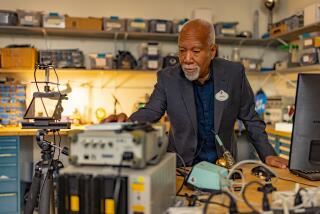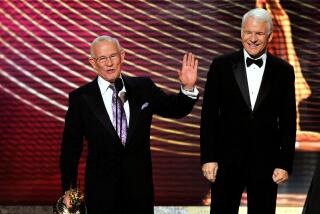Chuck Foley dies at 82; co-invented Twister party game
Chuck Foley, whose Twister party game brought shoeless strangers achingly close to one another and made even the most spirited rounds of Scrabble seem comparatively tame, has died. He was 82.
The inventor, who held 97 patents, died July 1 in a care facility in St. Louis Park, Minn., family members said Wednesday. He had Alzheimer’s disease.
Foley came up with a wide variety of gizmos and games, including a hand-launched toy helicopter, soft-tipped darts, plastic toy handcuffs and “un-du,” a liquid adhesive remover used by librarians, people who keep scrapbooks, and anyone who wants to lift an uncanceled stamp off a used envelope.
PHOTOS: Notable deaths of 2013
“I was born with a gift,” Foley told the New York Times in 1998. “Ideas pop into my head.”
Twister, marketed as “The Game That Ties You Up in Knots,” was born as a collaboration between Foley and cartoonist Neil W. Rabens when they worked at a St. Paul, Minn., design firm in the mid-1960s.
“I remember the patent office saying we needed mechanical parts to patent it,” Rabens told the Los Angeles Times on Wednesday. “It was Foley who said, ‘How about using people as the parts?’”
Foley even went to Washington and demonstrated to astonished patent officials just how Twister is played — a process whose hilarity is not conveyed in a patent filing that says: “With a particular limb of each player on a particular locus of a certain column, and with the referee chancing to call for the movement of the said limb to a locus of the same column, the players shall each be required to move that same limb to another locus of that same column.”
In other words: With a turn of the spinner, people in various contortions on a plastic mat marked with colored dots get up close and personal in a hurry.
“The biggest problem people had in entertaining was worrying about people enjoying themselves and not sitting in corners,” Foley told the Dallas Morning News in 1998. Twister “pulled people together. You take your shoes off and everybody’s equal — I don’t care who you are.”
Some other inventions had their critics. When a caller chewed out Foley for devising a game with a long plastic tube that children could crawl through, he was unfazed, said Rabens, his lifelong friend: “He told her that we had tested it by putting his 2-year-old daughter in there for an extended period of time, and other than being a little hungry, she was just fine.”
Born Sept. 6, 1930, in Lafayette, Ind., Charles Frederick Foley displayed his inventiveness early. When he was 8, he came up with a latch that would automatically close a gate to keep livestock penned on the family farm.
After high school, he worked on a Ford assembly line and saw many possibilities for innovation. When he equipped his 1952 Plymouth Belvedere with homemade, tricolor taillights — green for speeding up, orange for slowing down and red for stopping — the police officer who cited him also congratulated him.
After serving in the Michigan Air National Guard from 1950 to 1953, he was a salesman for a furnace-cleaning service and worked for companies developing products such as an automatic cocktail shaker.
“He was extremely creative and had an open mind to any opportunity that could make a difference in people’s lives,” son Mark Foley said.
However, he said, his father wasn’t an astute businessman and, aside from the financial strains of raising nine children, didn’t much care about money.
“Every deal he did was on a handshake,” Mark Foley said. “He was more on the side of creativity.”
Being a boss never appealed to him.
“I’d rather be in hell with my back broke,” he told the Charlotte Observer in 2006.
Twister rocketed to popularity after Johnny Carson and actress Eva Gabor played it on “The Tonight Show” in 1966. However, Foley said in interviews that he made only $27,000 on it after a dispute over royalties with his boss Reyn Guyer, the owner of the design firm that employed him.
Guyer told the Charlotte Observer that he never promised Foley any royalties.
In his later years, Foley lived in North Carolina, where he regularly spoke to school classes about inventions, inspiration and hard work.
PHOTOS: Notable deaths of 2013
He is survived by six sons and three daughters; two sisters and two brothers; and 16 grandchildren.
He never stopped inventing, Mark Foley said. At a family Thanksgiving dinner in Dallas a few years ago, he stared into the backyard swimming pool, intently watching a motorized pool-cleaning device on the bottom.
“You know,” he said, “if you put a crazy image of a shark with earphones on that thing, it would be fun and cool and people would love it!”
More to Read
Start your day right
Sign up for Essential California for the L.A. Times biggest news, features and recommendations in your inbox six days a week.
You may occasionally receive promotional content from the Los Angeles Times.







